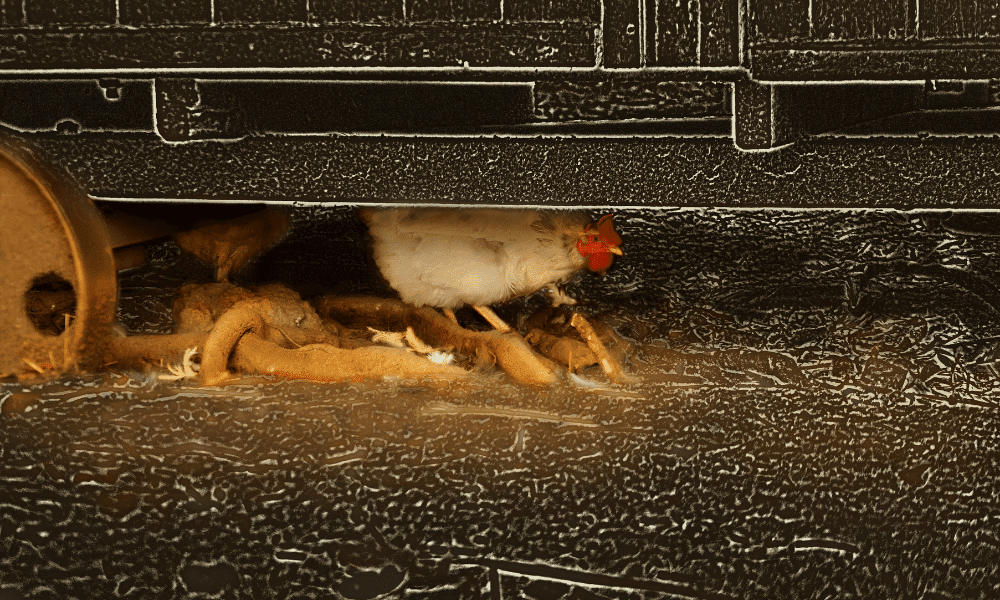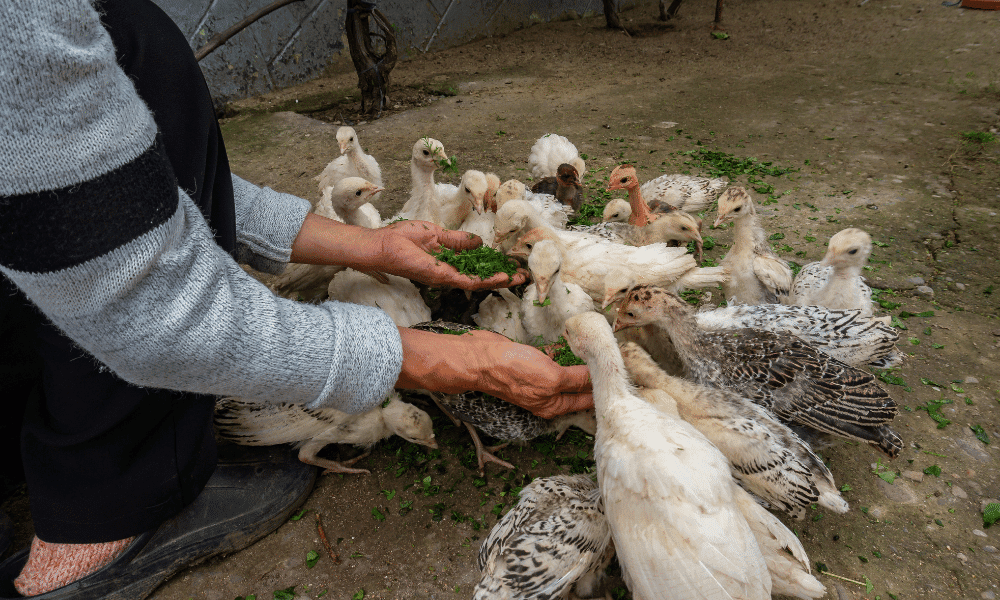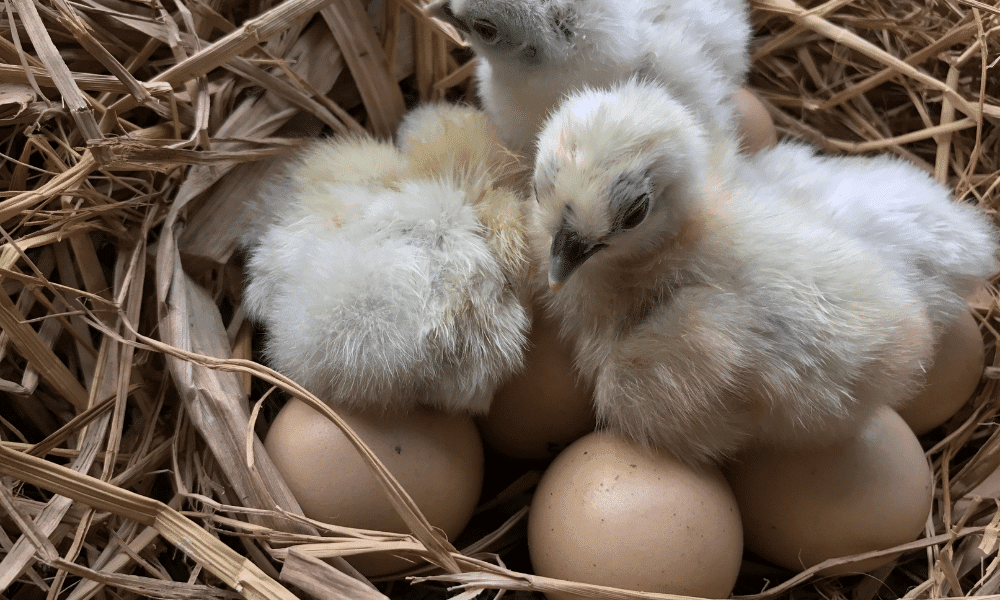Chickens are vulnerable creatures with many natural predators and not many ways to protect themselves. So they use everything in their arsenal to avoid danger entirely. This is why they more easily exhibit fear reactions and behaviors, comparable to other prey animals.
But, as keen backyard farmers and avid chicken keepers, we want our chickens to like us!
As we know, chickens can take time to warm up to their owners. But, there are repeatable actions you can take to earn their trust and them being so scared and reserved around you.
Here is why your chicken is scared of you, how to tell they’re actually scared of you, and how you can gain their trust.
Why Is My Chicken Scared Of Me?
It’s in the chicken’s natural instincts to be anxious or skittish around new people, animals, or environments. Plus, aside from their instincts, chickens also have a surprisingly good memory and they use it to map what is dangerous and what is safe, based on past experiences.
Therefore, the main reason your chicken is scared of you is that it simply doesn’t trust you fully yet. This may be because of previous experiences with you or others, such as being chased or mishandled, or simply because it doesn’t know you well enough yet.
But, don’t worry. Chickens don’t tend to hold grudges. The more time you spend with your chickens, always showing positive behaviors such as feeding, giving treats, and spending time around them, the more you will build their trust. Once your chicken trusts you it will rarely exhibit fearful behaviors, only when there are loud, unknown noises, or sudden movement.
How To Tell If Your Chicken Is Scared of You
Given chickens are naturally anxious creatures, it can sometimes be hard to tell if your chicken is actually scared of you, or if it’s just being naturally cautious. You can tell by observing a few key behaviors and their intensity:
Running Away
Probably the most common and clear sign that your chicken is scared of you is when they repeatedly run away from you. This behavior can range from simply getting out of your way and keeping a few feet distance from you, to running for cover when you come out in the yard.
Chickens normally only show behaviors on the intense end of the scale when they are young and in a new environment, or you’re a new owner for example.
It’s important not to chase your chickens if they are running away from you because this will more easily cement the idea that you’re a threat.
Hiding

When chickens are scared they get surprisingly good at hiding and they always manage to get into places you never thought possible.
If something particularly scary has recently happened, like a predator attack or by being chased, then your chickens may go into hiding or leave your property, even for up to 24 hours.
This can be a mentally stressful situation, but it’s important to remain calm and search everywhere you can, even the places you would never think the chickens could get to, like under the house or shed, or deep in bushes.
Usually, if it’s due to something you did around the chickens accidentally, like dropping something or causing a loud unknown noise, then your chickens won’t stay hiding for long. You can encourage them back out by bringing treats or table snacks into the yard.
Freeze On The Spot
Occasionally chickens will also freeze in response to perceived danger or threat. While they freeze they will be observing everything carefully. This usually occurs when the chickens hear a noise before they see its source, freezing to look for the threat.
It’s important not to confuse this with hens’ submissive squatting, where your chickens will squat down when you approach thinking you are a rooster!
What You Can Do To Get Their Trust
Although it’s in your chicken’s nature to always be cautious, there are ways you can gain trust in your chickens. Gaining trust in your chickens is key to building a real connection with them and feels incredibly special.
So, if your chickens are acting scared of you, here are some key behaviors you can repeat to build their trust and companionship:
Sit With Them
If you only see your chickens when you go out to feed them, gather their eggs, and do the backyard gardening, your chickens won’t see you enough to build real trust with you. But, if you are around them frequently, they will more quickly learn you mean no harm.
Seeing your chickens once or twice to feed them isn’t enough to get them to trust you. If you spend more time with them, they’ll get used to your presence. They may even start to show excitement every time you sit with them.
Over time, you’ll start to notice signs that your chicken likes you, like following you or running to greet you when you arrive.
Talk To Them
Talking to your chickens is not just for crazy chicken ladies. Talking to your chickens will not only get them used to your voice and presence, but your tone can tell them a lot about your behavior. This helps chickens understand your intentions.
Over time, unless I’m going crazy, you’ll notice your chickens start to chirp back at you, almost like you’re having a conversation. It’s hilarious and addicting but is one of the many ways you’ll be able to build a relationship and trust with your chickens.
The more often you do this, the more comfortable they’ll get. Eventually, you may find your chickens sitting or napping beside you. This means that they fully trust you and don’t find you a source of a threat anymore. Just like with their chicken friends in the flock.
Give Them Treats

Just like with most backyard farm animals, you can gain a chicken’s trust by giving them treats. This is because they will immediately associate you with the joy that the treats bring them!
Over time, the association will become so strong that even without treats they will still feel joy, and voila, you’ve just trained your chickens. Although, you need to still make an effort to gain their trust by repeated exposure: sitting and spending time with them. Because if you continuously stop bringing treats you may lose that initial association.
In the initial stages of feeding them treats, always be sure not to try to grab or hold them, as they won’t be ready for this kind of attention.
Always try to feed them healthy table snacks or treats, from root vegetables, seeds or mealworms.
Avoid Physical Contact Until Their Ready
A mistake a lot of new chicken owners make is rushing into physical contact with their chickens. Sure, grabbing them once or twice to transport your chickens is completely fine. But, if you’re just trying to gain their trust, grabbing them or trying to pet them at every opportunity will only slow down the process.
You’ll know your chickens are ready for pets and physical attention when they commonly approach you, follow you, and always want to be around you, even when you don’t have treats!
Why Are My Baby Chicks Scared Of Me?
When you first get baby chicks, whether it’s from tractor supply or from your own mother hen, you have to remember: this is the first time these chicks are interacting with people. It’s entirely normal for some baby chicks to be apprehensive about you, and even a little scared.
Baby chicks are even more vulnerable than their mothers, so it’s important you take extra care of them. Any sudden movements, loud noises, or mishandling can quickly upset your chicks, and they can over time become more scared of you.
But, by taking care of them correctly and spending time with them, they are more easily going to associate you with positive emotions and ultimately become more comfortable around you. This comfort and companionship will continue with their age, from chick to pullet, to adult.
How To Gain Baby Chicks Trust

Much like adult chickens, to gain a baby chick’s trust you have to spend enough time with it to get used to you. Here are a few easy ways to encourage baby chicks to get comfortable around you:
Hand Feed Them
One way you can really bond with baby chicks is to hand feed them chick starters or other appropriate feed. This will help them build an association between you and being cared for. This really helps chicks warm up to you, and you will quickly see them become excited to see you when you approach.
From a young age, baby chicks can eat rolled oats, or carrots – both offering them a host of nutritional benefits as a supplement for their normal chick starter.
Spend Time With Them
Just like with adult chickens, or most other animals, the longer you spend with them doing positive actions, the more your chicks will build trust with you.
During the initial times, you’re with them try to limit handling them physically. Otherwise, you risk scaring them. If you do this every time you’re with them they will begin to associate you with the anxiety of being handled.
Final Words
Chickens being scared is based on instinct and past experience. So, chickens will be scared of you if you simply haven’t spent enough time with them or built their trust.
Fortunately, there are some easy, repeatable actions you can take to quickly begin building their trust and companionship, from providing treats, to just spending time with them.
By repetition of these behaviors, your chickens will warm up to you and stop being so scared!
